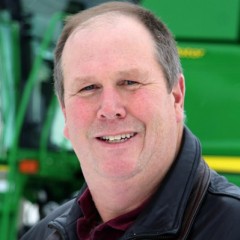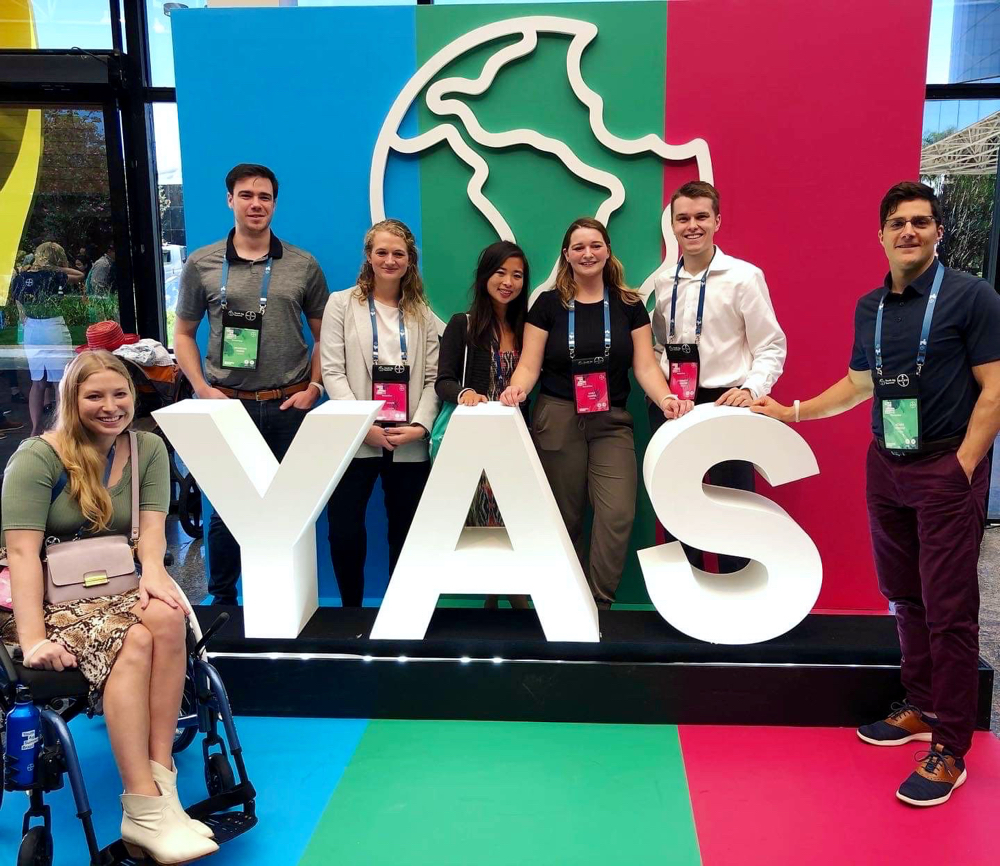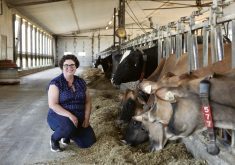How do we feed a hungry world? That was the question posed to 100 young people, 18 to 25 years old, from 45 countries when Bayer CropScience brought them together in Brasilia, Brazil, for the 4th biannual Youth Ag Summit in November.
It is a critical question. Amid all the numbers a farmer sees every day, it can be easy to lose sight of one of the most important. According to the Food Aid Foundation, “Some 795 million people in the world do not have enough food to lead a healthy active life. That’s about one in nine people on Earth.”
Read Also

Outstanding Manitoba farm couple harnesses innovation and data
For over a decade Paige and Marcus Dueck have embraced their passion for farming while striving to innovate and expand…
The World Health Organization estimated 821 million people were going hungry, and their report “The State of Food Security and Nutrition in the World 2018” stated: “Hunger has been on the rise over the past three years, returning to levels from a decade ago.”
To most farmers and food producers, the answer seems obvious. We need to produce more food. But this answer ignores a key fact.
“The world already produces enough food to feed everyone,” says the website World Hunger.org. “A principal problem is that many people in the world still do not have sufficient income to purchase (or land to grow) enough food or access nutritious food.”
If the ultimate purpose of agriculture is to feed the world, we are failing. Simply growing and producing more will not end world hunger. Worse yet, if unchecked, the hunger problem will get worse. Forecasts of a global population of 10 billion by 2050 will require 50 per cent more food from less land with fewer resources.
A new approach with fresh ideas for feeding the world is needed. And who better to come up with these ideas than the next generation of food producers?
That is the logic behind Bayer’s sponsorship of the global Youth Ag Summit. According to Komie Hossini, associate communications business partner with Bayer, the Youth Ag Summit is part of a commitment Bayer makes to youth education.“The summit is focused on keeping youth engaged in food and agriculture. It is intended to inspire and recruit young leaders into an industry that is often seen as less sexy than other industries.”
The Youth Ag Summit website outlines Bayer’s four objectives:
- To connect and support young leaders who will champion sustainable agriculture and food security.
- To bridge the understanding gap between those who produce our food and those who consume it.
- To inspire the next generation to develop their interest — and perhaps pursue careers — in science and agriculture.
- To promote special education programs locally and to collaborate with global youth groups and research institutes.
In essence, the summit is a platform to incubate and then pressure test new ideas by presenting them to fellow delegates from around the world as well as to Youth Ag Summit alumni and external mentors.
Bayer has three expectations of the delegates selected to attend this global summit. First, each delegate must create a set of personal objectives to follow when they return home to their communities.
Second, each must commit to advocate for modern agriculture as well as pledge to raise awareness about the need to feed a hungry planet.
Third, delegates are to continue to work on the individual projects which they presented to the summit.
Five of the 100 participants selected by Bayer to participate at the 2019 summit hailed from Canada. Here are the ideas they proposed for improving global food security:
Kelcie Miller-Anderson

Kelcie Miller-Anderson is a 25-year-old living in Calgary. Her proposal so impressed the summit that she became one of three participants selected to attend Bayer’s 2020 Future of Farming Dialogue, the 2020 Nuffield Conference in Australia, and the 2021 Youth Ag Summit, which will take place in China.
Miller-Anderson’s project grew out of her concern from a few years ago about declining bee populations. According to Miller-Anderson, bees are responsible for pollination of 80 per cent of crops grown. “Bees are really important!”
Upon study of this problem, Miller-Anderson discovered bee numbers were only the tip of the iceberg. Besides pollination concerns, declining bee numbers were also resulting in reduced honey production and loss of income to beekeepers. But what really upset Miller-Anderson was that distributors and retailers in many areas were often blending inferior honey or even secretly altering honey with other products like corn syrup to increase the amount of “honey” they had to sell, with a view to higher profits. “Honey is one of the most fraudulent and adulterated foods in the world,” Miller-Anderson says. So not only were beekeepers losing money, but consumers were often ending up with an inferior product.
Her proposal is to use block chain technology to track honey from hive to consumer. She wants consumers to be able to scan a QR code on a honey container to learn all about the production and processing of that individual container of honey. She says the technology is available for consumers to learn everything from the name of the beekeeper to the location of the hive the honey came from and even the type of crops the bees were foraging to produce the honey. Most importantly, such complete transparency will greatly reduce the chances of tampering of the honey.
Honey producers could also gain financially by being able to offer a premium product to consumers.
Miller-Anderson adds: “More information equals more consumer trust!”
Miller-Anderson’s proposal is much more than just a pipe dream. She is in the process of setting up a company to put her idea into practice, and she is heading to New Zealand for beta testing of her process. Then, later this spring, she will travel to China to introduce her system to beekeepers there. She also hopes to test her technology as early as this summer in Alberta.
Karly Rumpel

From a farm near Craven, Sask., 22-year-old Karly Rumpel recently completed agronomy studies at the University of Guelph.
Rumpel wants to fight hunger by reducing food waste. She is concerned about the amount of fresh food that is wasted because it is no longer saleable as fresh food. She proposes a system of grocers donating soon-to-be discarded fresh food to local volunteer organizations who would then preserve and can the food and distribute it to food banks and local shelters.
Rumpel explains: “Canning is a really easy process and can be used to preserve food which would otherwise be wasted, and make it useable for hungry people.”
Rumpel is currently testing canning procedures with various fresh produce to determine which discarded foods can be saved from the dump by canning.
Emmett Sawyer

At 19, Emmett Sawyer is studying agriculture at the University of Lethbridge. He is a fifth-generation member of a family farm located west of Acme, Alta.
Sawyer went to the conference promoting the idea of rooftop garden kits in urban areas as a way of increasing the food supply. But a real benefit of the summit is to be able to break off into small groups where the proposals are examined and critiqued. As he met with nine other young people from around the world, he realized simply promoting rooftop gardening is not enough. People have to be taught how to grow rooftop garden crops. Furthermore, if rooftop gardens are to be successful, infrastructure and automation are needed to collect, store and deliver rainwater to the gardens for when water is needed.
While he is still 100 per cent behind the idea of rooftop gardening, he realized the real need is for information. So he is now working on developing software and apps that provide food production information relating to the growing of crops both on rooftops as well as in greenhouses. The new short-term goal is to provide greenhouse operators as well as potential rooftop gardeners with software, apps, AI and automation so food crops can be grown efficiently and in an environmentally friendly way by anyone.
Sawyer believes the future of food production is really dependent on digital farming. As an example, he spoke of the tour that summit participants went on to a one-million acre farm. That farm had reduced irrigation water requirements by 90 per cent while increasing production by 240 per cent by utilizing data collection and analysis. He said this is the type of information small-holder farms need to become efficient. He frets that Canadian farmers are not fully utilizing the data they are already gathering.
Grace Heuver

Grace Heuver is 18 and grew up on a sod farm near Strathmore, Alta. She is promoting urban rabbit farming. “Protein is very expensive for hungry people and there is no way most people can raise their own conventional livestock for protein.”
However, rabbits are easy to raise, they require little space, and they provide a nutritious meat. Information on raising rabbits for meat is what is lacking, so Heuver is working on an online training course that would be available anywhere.
Leah Davidson

Leah Davidson, 25, was raised near Sherbrooke, Que. She came to the summit with more international experience than most people acquire in a lifetime. Brazil was the 45th country she has travelled to. Over the last decade she has worked in Peru and Chile setting up microfinancing loans for individuals and small businesses. She created Project Dash in Washington, D.C., which partnered with Door Dash to “increase food sustainability and mitigate hunger.” She has been named a UN and a World Economic Youth Ambassador.
Davidson is a graduate of the prestigious Wharton School of Business and she currently works as a business consultant in Washington, D.C. Davidson has been recognized as one of the Top 20 Under 20 in Canada, Top 25 Environmentalists Under 25 and an entrepreneur with The Next 36.
According to Davidson, most of the food in the world is produced by small holders who have low technology literacy, low financial literacy and do not have access to the internet which could provide the information and access to resources they require to become more productive.
Her proposal for the summit is “to connect farmers to the internet, without the internet.”
Davidson is proposing working with Yara, a global leader in agronomics, to create a voice-response portal where small-holder farmers could phone a local number which would connect them to an artificial intelligence robot which would collect production information from the producer regarding the question or problem they have.
The robot would then sort through Yara’s agronomy records to provide applicable information and solutions for the farmer’s concerns. If the robot could not find an answer, it would automatically connect the caller to a Yara agronomist.
All five participants raved about the Youth Ag Summit. Comments included:
- “It was great to share our passion and drive to feed a hungry planet,” says Miller-Anderson.
- “The Youth Ag Summit was an amazing, life changing, eye opening, and learning experience. These events will change the world,” says Rumpel.
- “This event completely changed my life and the way I look at the world. I can’t thank Bayer enough,” says Sawyer.
- “The most important thing I gained from the summit was hope. Sustainable agriculture was something that can be achieved. I was able to share ideas with the young people who will make a huge difference in the world in the future,” says Heuver.
- “The main benefit of the Youth Ag Summit was the network and contacts you develop with youth from over 40 different countries and cultures. The summit was very well organized and had amazing speakers,” says Davidson.
For outside observers of this summit, the take-home is the outside-the-box thinking these young people have about feeding a hungry world. Instead of simply expanding farm size and growing more broad-acre crops, they looked for affordable solutions that hungry people could implement or use themselves. They make us all think.
Purpose vs. passion. Your response
In December I asked if you farm because of purpose or passion. After that article went to press, Dr. John Ikerd, professor emeritus at the University of Missouri, responded to my questions with the following:
Regarding your questions about purpose and passion, I think people have a “passion” about doing things that reflect their “purpose.” I don’t think people are comfortable talking about purpose because purpose isn’t easy to define or explain — we can’t even prove that our life has any purpose. Or they may think of a purpose as something that has special importance, such as being a doctor, elected official or minister. Farmers may see farming as being important because “farmers feed the world,” but most don’t see how they individually contribute much to that mission. They don’t see what they are doing as being particularly important to society or humanity.
It’s easier for farmers to admit that they have a “passion” for farming. They don’t have to explain where the “passion” comes from or why they have it. Or, maybe they say they grew up on a farm or just always wanted to be a farmer. We don’t really need a reason to be passionate about something. It sort of an irrational feeling that it’s okay to have, because society tends to approve of passionate people. I personally think we are passionate about things that give us a sense of satisfaction or “fulfillment,” which gives us the feeling we are fulfilling some useful purpose — specifically our purpose. Farmers can admit they feel passionate about farming without trying to justify how what they are doing is particularly important to anyone except to them and perhaps their families. If they admit they feel they have a purpose, they feel they have to justify their importance.
I personally don’t feel that anyone’s purpose is more important than any one else’s purpose — no matter how highly or lowly society may value particular occupations or undertakings. I think we each have an important contribution to make to the greater good of humanity. But that’s not a simple case to make, so most people don’t bother trying to make it.
My younger brother was a farmer. He died last Sunday. That’s where I have been this week — attending his memorial services in Missouri. He had a passion for farming and I have no doubt that farming was his purpose in life — and he fulfilled it. I doubt that he would have told you that farming was his purpose. It was simply all he ever wanted to do… I think that is how we find and define our purpose. It is simply what we have always wanted to do.
















